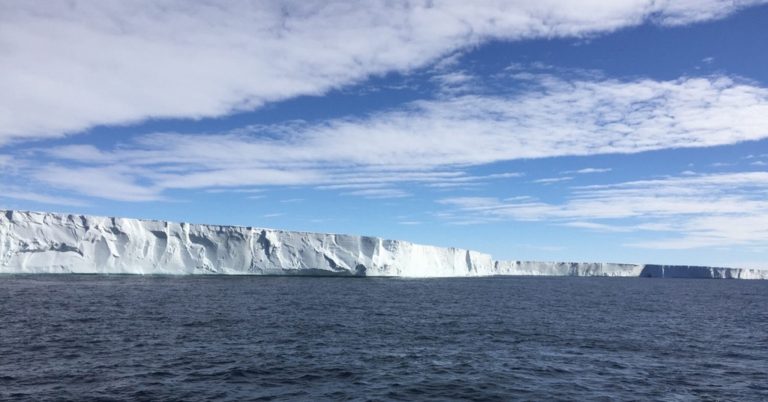Ocean currents threaten to collapse Antarctic ice shelves
Meandering ocean currents play an important role in the melting of Antarctic ice shelves, threatening a significant rise in sea levels.

A new study published in Nature Communications has revealed that the interplay between meandering ocean currents and the ocean floor induces upwelling velocity, transporting warm water to shallower depths. This mechanism contributes substantially to the melting of ice shelves in the Amundsen Sea of West Antarctica. These ice shelves are destabilizing rapidly and contributing to sea level rise.
Led by Taewook Park and Yoshihiro Nakayama, an international team of researchers from the Korea Polar Research Institute, Hokkaido University, and Seoul National University employed advanced ocean modeling techniques to investigate the underlying forces behind the rapid melting ice shelves. In a departure from prior assumptions linking ice shelf melting primarily to winds over the Southern Ocean, this study underscores the significant role played by the interactions between meandering ocean currents and the ocean floor in driving the melting process.
The Pine Island and Thwaites ice shelves are among the fastest-changing in Antarctica and are of particular interest due to their vulnerability to warming ocean waters. They act as massive barriers restraining the glaciers behind them from flowing into the ocean. However, their rapid melting and potential collapse pose a significant threat to coastal communities worldwide because of the resulting rise in global sea levels.
The study focused on the role of a layer of warm water beneath the frigid surface waters, known as the ‘modified Circumpolar Deep Water,’ in melting these ice shelves from below. “The intensity and trajectory of ocean currents encircling the ice shelves directly govern the influx of warm water, thereby intricately shaping their rate of melting” explains Taewook. This shows the importance of the ocean in understanding and addressing the impacts of climate change.
The researchers paid attention to the ‘thermocline depth’, which is the depth of the interface between warmer deep waters and cooler surface waters. Variations in thermocline depth significantly affect the influx of warm water toward the ice shelves. Until now, it has been believed that intensified westerly winds north of the Amundsen Sea propelled ocean currents along the shelf break, carrying warmer water toward ice shelf cavities. This phenomenon is particularly pronounced during El Niño events.
“Our findings challenge conventional wisdom,” Nakayama asserts. “Our study underscores that the interplay between meandering ocean currents and the ocean floor generates upwelling velocity, bringing warm water to shallower depths. Subsequently, this warm water reaches the ice-ocean interface, accelerating ice shelf melting.” Nakayama concludes, “This internal oceanic process driving ice shelf melting introduces a novel concept. With this in mind, we have to reevaluate winds driving Antarctic ice loss, which can significantly impact future projections.”
Original Article:
Taewook Park, Nakayama Yoshihiro, SungHyun Nam. Amundsen Sea Circulation Controls Bottom Upwelling and Antarctic Pine Island and Thwaites Ice Shelf Melting. Nature Communications. April 11, 2024.
DOI: 10.1038/s41467-024-47084-z
Funding:
This study was supported by the Korea Institute of Marine Science & Technology Promotion (KIMST), in turn, funded by The Korean Ministry of Oceans and Fisheries (RS-492 2023-00256677; PM23020); the Korea Polar Research Institute (PE24110); the Ministry of Education, Culture, Sports, Science, and Technology of Japan (MEXT) Grants-in-Aid for Scientific Research (21K13989); and, the Inoue Science Foundation.
Contacts:
Dr. Taewook Park
Division of Ocean and Atmosphere Sciences
Korea Polar Research Institute
Email: twpark[at]kopri.re.kr
Assistant Professor Yoshihiro Nakayama
Institute of Low Temperature Science
Hokkaido University
Email: Yoshihiro.Nakayama[at]lowtem.hokudai.ac.jp
Sohail Keegan Pinto (International Public Relations Specialist)
Public Relations & Communications Division
Office of Public Relations and Social Collaboration
Hokkaido University
Tel: +81-11-706-2186
Email: en-press[at]general.hokudai.ac.jp
